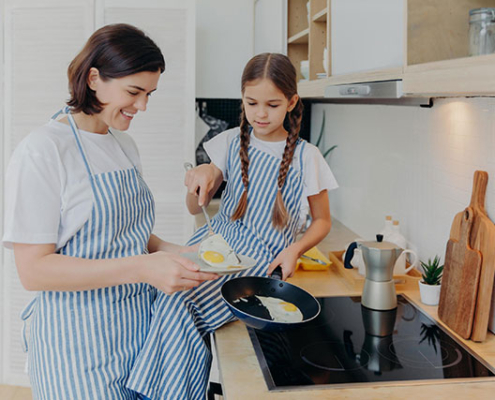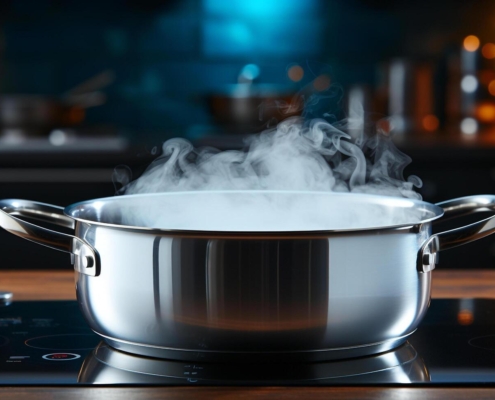Gas vs. Electric Stoves: Common Issues and Repair Tips
 Choosing between a gas or electric stove is a common dilemma for many homeowners, each option presenting its own set of advantages and challenges. Whether you’re a seasoned chef or someone who simply enjoys a home-cooked meal, knowing the common issues and repair tips for both types of stoves is crucial in keeping your appliance in great shape. Plus, if you’re in need of appliance repair, understanding these distinctions could save you time and money.
Choosing between a gas or electric stove is a common dilemma for many homeowners, each option presenting its own set of advantages and challenges. Whether you’re a seasoned chef or someone who simply enjoys a home-cooked meal, knowing the common issues and repair tips for both types of stoves is crucial in keeping your appliance in great shape. Plus, if you’re in need of appliance repair, understanding these distinctions could save you time and money.
This guide goes into the intricacies of gas and electric cooktops, offering insights and practical advice to keep your kitchen running smoothly. Get ready to explore everything from minor DIY fixes to when it’s best to call in the experts for stove repair.
Article Summary:
- Understanding Gas and Electric Stoves: Key Differences
- Common Issues with Gas Stoves
- Common Issues with Electric Stoves
- DIY Repair Tips for Gas Stoves
- DIY Repair Tips for Electric Stoves
- When to Call a Professional: Recognizing Major Repair Needs
- Choosing the Right Appliance Repair Service
- Maintenance Tips for Prolonging Stove Life
- Stove Repair with Comfort Appliance Repair
1. Understanding Gas and Electric Stoves: Key Differences
While there are many pros and cons of gas vs. electric stoves, the main difference between gas and electric cooktops lies in their fuel sources and heating methods. Gas stoves use natural gas or propane to ignite a flame, while electric stoves use electricity to heat up coils or elements. This fundamental distinction affects not only the cooking process but also the potential issues that may arise with each type of stove.
Another key difference is the cost – both upfront and ongoing – for these two types of stoves. Generally, gas stoves tend to be more expensive initially due to installation costs, while electric stoves have a higher operating cost over time due to energy consumption.
2. Common Issues with Gas Stoves
Gas stoves have been a kitchen staple for decades, and while they are generally reliable, they can still experience some issues. These include problems with the gas supply, igniter, burner, or control knobs. For example, if your stove’s gas supply is interrupted or faulty, it could result in uneven heating or a complete lack of heat. Additionally, if the igniter is malfunctioning or dirty, it may not ignite the gas correctly.
3. Common Issues with Electric Stoves
Electric stoves may seem simpler than their gas counterparts, but they too can face their fair share of issues. Some of the most common ones include damage to the heating elements or coils, problems with the control panel or switches, and issues with the temperature sensor. If any of these components are damaged or malfunctioning, it can lead to uneven heating or an inability to reach the desired temperature.
Read more about frequent issues with both gas and electric cooktops in our guide “The 7 Most Common Cooktop Problems (and How To Fix Them).”
4. DIY Repair Tips for Gas Stoves
If you’re experiencing issues with your gas stove, there are a few simple repair tips you can try before calling in a professional. For example, if your burner is not lighting properly, make sure the igniter and burner ports are clean and free from debris. You can also check the gas supply valve to ensure it is fully open.
Another common issue with gas stoves is a malfunctioning control knob. In this case, it may just need to be adjusted or replaced. Refer to your stove’s manual for specific instructions on how to do this.
5. DIY Repair Tips for Electric Stoves
Similarly, there are some easy fixes you can try for common issues with electric stoves. For example, if a burner is not heating evenly, it may be due to a damaged or dirty heating element. In this case, replacing the element should solve the problem.
If your control panel or switches are malfunctioning, you can also try cleaning them with a mild soap and water solution. However, keep in mind that working with electricity can be dangerous, so if you’re unsure or uncomfortable with any repair tasks involving wiring or electrical components, it’s best to call a professional.
6. When to Call a Professional: Recognizing Major Repair Needs
While some minor issues with your stove can be resolved with DIY repair tips, there are certain situations where it’s best to call in a professional appliance repair service. This includes any repairs involving the gas line or electrical wiring, as these can be hazardous and should only be handled by trained technicians.
Additionally, if your cooktop is constantly experiencing the same issue despite trying different troubleshooting methods, it may indicate a larger underlying problem that requires expert knowledge and tools to fix properly.
7. Choosing the Right Appliance Repair Service
When it comes to choosing an appliance repair service for your gas or electric stove, it’s important to do your research and choose a reputable company with experienced technicians. Look for companies that are licensed and insured, offer warranties on their services, and have positive customer reviews.
It’s also a good idea to inquire about their experience specifically with gas or electric cooktop repair, as well as the types of repairs they specialize in. This will ensure that you’re getting the best service possible for your stove.
8. Maintenance Tips for Prolonging Stove Life
 There are also steps you can take to prevent issues with your stove and prolong its lifespan:
There are also steps you can take to prevent issues with your stove and prolong its lifespan:
- Regular Cleaning: Keep your stove surfaces and burners clean to prevent buildup of grease and food debris, ensuring efficient operation and reducing the risk of damage.
- Check Gas Connections: For gas stoves, periodically inspect gas connections and hoses for any signs of wear or leakage to maintain safety and performance.
- Inspect Heating Elements: For electric stoves, routinely check the heating elements for any signs of wear or damage, and replace them as needed to maintain consistent cooking temperatures.
- Clean Ventilation: Maintain clear and clean ventilation filters and ducts to enhance air flow and reduce the risk of overheating, which can prolong the life of both gas and electric stoves.
- Regularly Inspect Electrical Connections: For electric stoves, check the electrical connections and cords for any signs of fraying or wear to prevent potential electrical hazards.
9. Stove Repair with Comfort Appliance Repair
Understanding the key differences between gas and electric stoves can help you troubleshoot common issues and know when to call in a professional appliance repair service. For those looking for trusted stove repair in Covington, Georgia and the surrounding areas, contact Comfort Appliance Repair. Our team of experienced technicians is well-equipped to handle any gas or electric stove repair needs, providing efficient and reliable service. Call today!
By Dennis Godynuk, Owner of Comfort Appliance Repair
Dennis Godynuk is the owner of Comfort Appliance Repair in Covington, GA. Comfort Appliance provides fast and reliable repair services for all major household appliances. Dennis and his team of experienced technicians can tackle any problem, from broken refrigerators to malfunctioning dishwashers, and their prices are very competitive. Customers can rest easy knowing that their appliances are in good hands when they call Comfort Appliance Repair.



